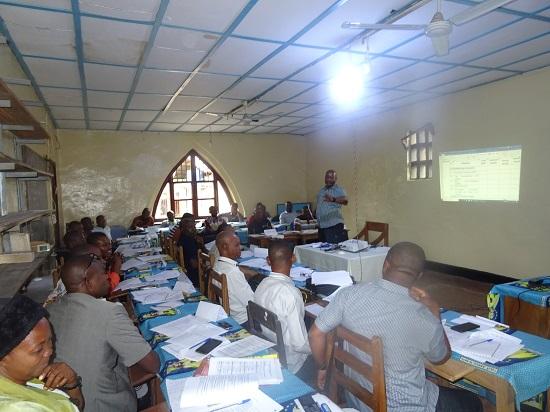Search
Viewing 1980 to 1995 of 3126 news
-
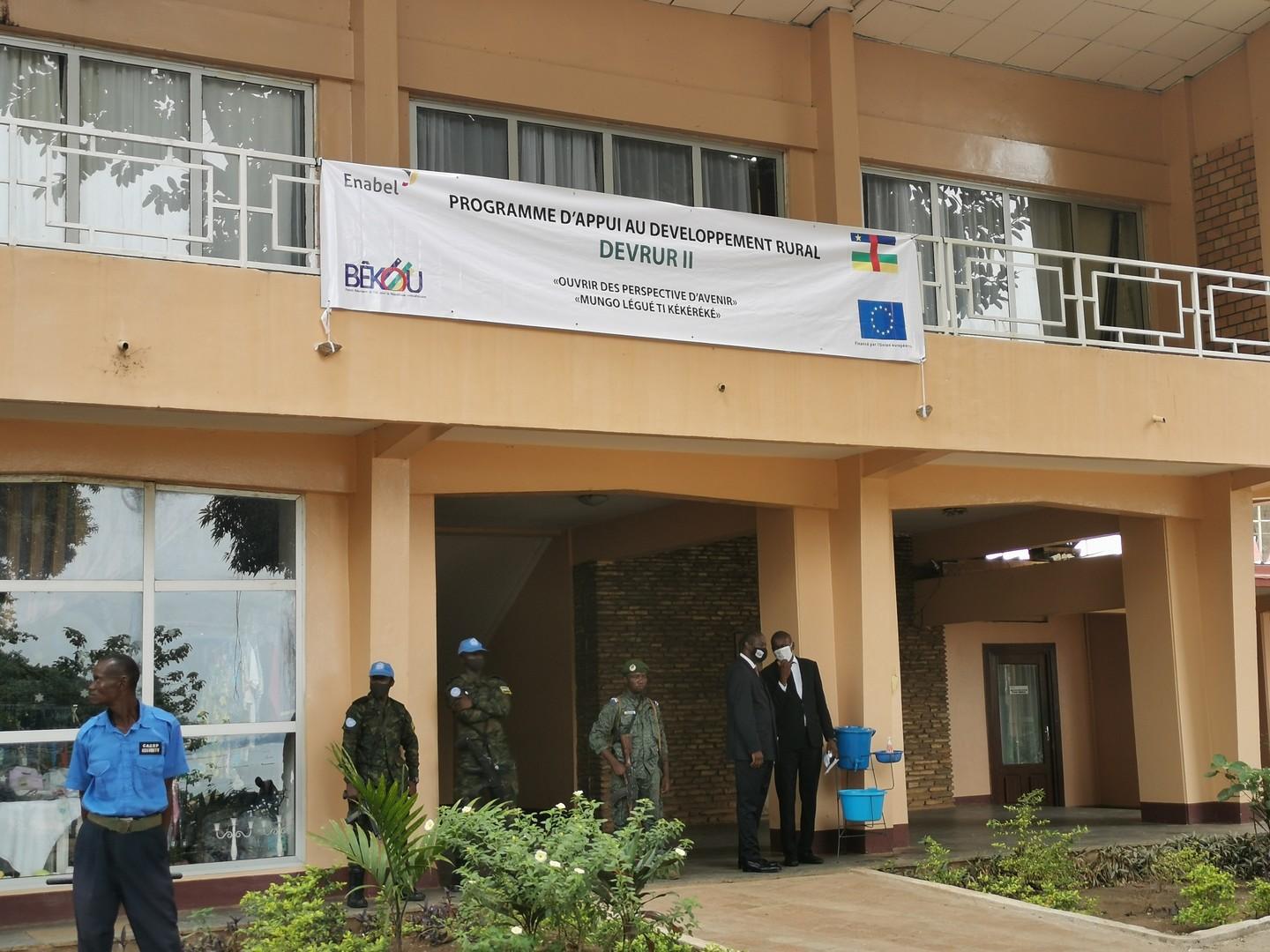
RCA: Lancement officiel du projet DEVRUR II à Bangui par le chef de l’Etat Centrafricain
Grâce MALI FAIDA | 05/05/2021
Le chef de l’Etat Centrafricain, le Professeur Faustin Archange Touadera, a procédé au lancement du programme d’Appui au Développement Rural « DEVRUR II » - « Ouvrir des perspectives d’avenir ». La cérémonie a eu lieu le mercredi 28 Avril 2021 à l’hôtel Oubangui de Bangui. Ce programme axé sur le développement rural et agricole, vise trois objectifs en Centrafrique :- L’amélioration et le renforcement de la qualification professionnelle des acteurs de développement agricole et rural et de l’insertion professionnelle des jeunes en milieu rural ;- Le renforcement des capacités de production, de transformation locales et d’accès aux sources fiables d’énergie (renouvelables) ; - Enfin le développement de l’offre de service financiers et non financiers qui soutient l’entreprenariat rural à Bangui et autour des agropoles multifonctionnelles. Pour cette relance socio-économique, le chef de l’Etat estime qu’« ouvrir des perspectives d'avenir, nécessite une synergie des interventions auprès des bénéficiaires et une parfaite collaboration entre les acteurs ». En se confiant à la presse à la fin de la cérémonie, le Président Touadera a appelé les centrafricains « à s’approprier du projet et prendre ensemble avec les partenaires le chemin de l’avenir ». Ce projet financé par le Fonds Bêkou à hauteur de 17.950.000 Euros sur une période de 4 ans allant de 2020 à 2024, touchera cinq (5) régions de la RCA notamment Bangui la capitale Centrafricaine, la Nana-Mambéré, Ouham, Ouham-Pendé, et Kémo. La cérémonie s’est déroulée en présence du Président de l’Assemblée Nationale, le Premier ministre et son gouvernement, l’Ambassadrice de l’Union Européenne en Centrafrique, le Chef de Poste de Adjoint de l’Ambassade de Belgique, la Représentante du Représentant Résident du Bureau Enabel RDC/RCA, les corps diplomatiques, les partenaires et acteurs du projet. Le Programme DEVRUR II vient augmenter le nombre de programmes que Enabel en RCA met déjà en œuvre que sont : UE-GODICA axé sur le secteur minier et UE-PCD orienté vers la Consolidation de la Démocratie en République Centrafricaine.
-
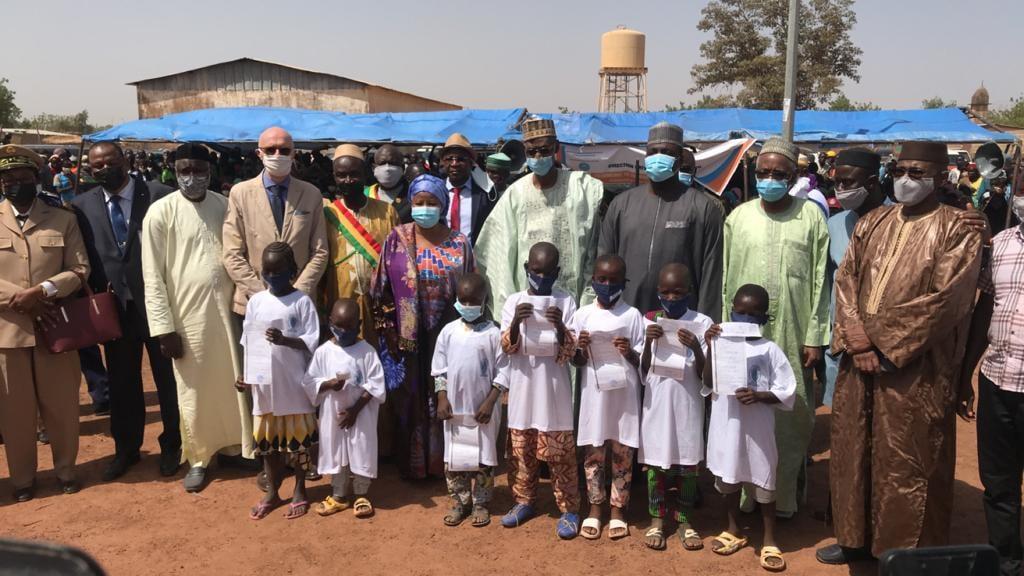
Projet Etat civil au Mali: remise d'actes de naissance à plus de 1000 enfants
Nènè TRAORE | 28/04/2021
A l'occasion de la clôture de la phase expérimentale des campagnes de rattrapage à l'état civil et des opérations d'enrôlement des populations défavorisées, la Direction nationale de l'état civil sous l'égide du Ministère de l'Administration Territoriale et de la Décentralisation, a organisé une cérémonie de remise d'actes de naissance à Marca-Coungo, dans le Cercle de Dioïla. 1000 enfants, dont 430 filles et 570 garçons, âgés de 1 à 15 ans, non déclarés à l'état civil, ni enregistrés dans le répertoire de la population, bénéficient désormais gratuitement, en plus de leur acte de naissance, d 'un numéro d'identification nationale communément appelé NINA.Pour le ministre de l'Administration Territoriale et de la Décentralisation, cette cérémonie est le résultat d'un long processus engagé par le gouvernement conformément aux objectifs fixés dans la Stratégie Nationale de l'État Civil.
-
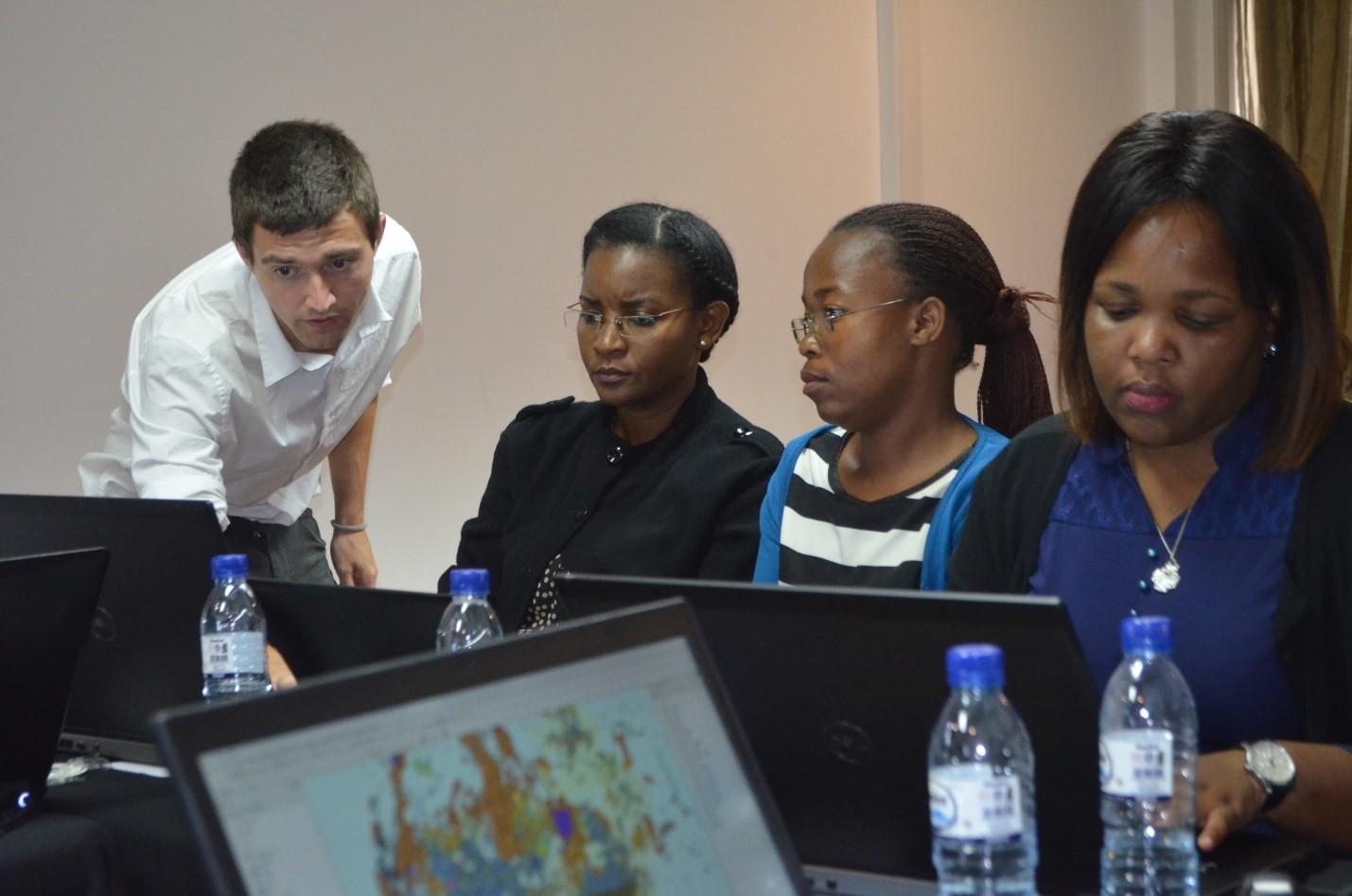
Mozambique: How to get to the gist of Geographical Information Systems for energy sector information management?
Akila MUNIR | 28/04/2021
News by: Evert Waeterloos A wider use of Geographical Information Systems (GIS) is an appealing prospect for an improved information base and coordination between the different players in Mozambique’s energy sector. Enabel and the partner Ministry of Mineral Resources and Energy (MIREME) launched a study in 2020 to provide a road map for the introduction of GIS and spatial data usage in the sector (https://www.enabel.be/publication/analise-do-sig-na-gestao-sustentavel-dos-recursos-energeticos-e-minerais-em-mocambique).This study found that a considerable range of energy and spatial data exist in MIREME. However, most of them are stored in hardcopy paper format. Where information is stored digitally, data are mostly kept on personal computers, which entails a huge risk of loss and under-utilisation. There is indeed little sharing and usage (metadata) beyond the individual data storage level. This is problematic, as the flow of information within MIREME as well as with other (inter)national organizations is a prerequisite for planning and monitoring of the energy sector. The availability of IT equipment such as computers, laptops, plotters and servers vary within each unit; however, most equipment is either obsolete or in a poor state. To introduce GIS for more effective data management and analysis, the study identified seven inter-linked dimensions, which will require attention in the short- to medium-term:A detailed, comprehensive needs and requirements assessment;Acquisition and management of spatial data and databases; Acquisition and management of technological resources;Human resources capacity development and management;Development and management of the institutional environment;Development of applications, products and services for the end user (public and other institutions);Monitoring the implementation of GIS.This study corroborates the importance of a good understanding among the key players in MIREME of the requirements of data, infrastructure and human resources for an effective use of GIS. This has also been emphasized by Enabel’s Junior Expert Antoine de Clippele throughout his deployment within the CB MIREME/Arene project (2019-2021). He coached the internal working group in MIREME accompanying the study through applied training and advice. The adoption of GIS is however a longer-term intervention, which depends on many factors such as knowledge, data quality, infrastructure and institutional set-ups. The project wants to make sure that while such central-led strategy of introduction and adoption of GIS is developed, hands-on introductions can be given to as many staff as possible to raise awareness and interest. In the wake of the aforementioned study, the Junior Expert further disseminated information and knowledge on GIS to provincial offices of MIREME in Sofala, Zambezia, Manica and Tete.Through a hands-on training – which due to Covid-19 restrictions had to take place online, a tailor-made introduction was administered by the Junior and his young MIREME counterpart Tina Matandire from 17 to 23 February 2021. The training covered basic GIS theory and focused on how to use different available GIS tools. The GIS software that was referred to can be accessed at no cost (open-source software). The training also showed different resources that can be accessed for learning and development purposes. Despite the challenges of delivering the training online, such as connectivity issues, the participants were motivated and participated fully during the entire training session. The project’s support to ICT equipment (laptops and internet infrastructure) across all provinces during 2020 and early 2021, has contributed to the success of the training. Following the training session, an internal manual was produced which summarizes all the different resources and key takeaways from the training session, and which is available to MIREME staff (https://www.enabel.be/publication/sistema-de-informacao-geoespacial-gis). It is indeed the intention to replicate and/or design follow up GIS trainings to staff members in other provinces, this time administered by MIREME staff such as Tina.This should contribute to an informed discussion on the implementation plan for the introduction of GIS within MIREME and on the collaboration with other relevant stakeholders.
-
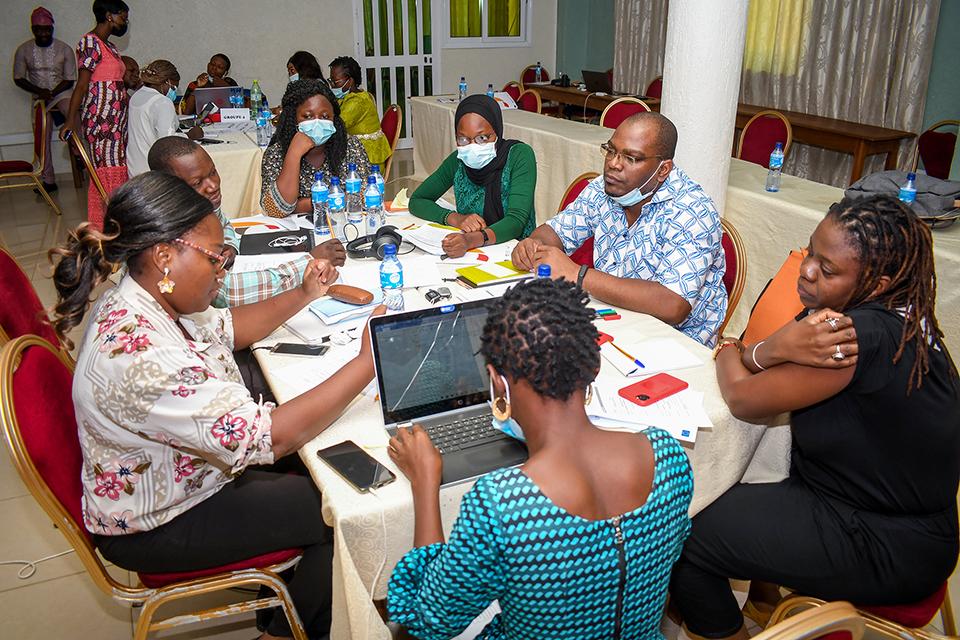
Au Bénin, Enabel appuie l’entrepreneuriat numérique inclusif
Reece-hermine ADANWENON | 27/04/2021
Grâce à la digitalisation et à l’émergence des nouvelles technologies, de nouvelles opportunités s’offrent aux femmes, en particulier dans l’entrepreneuriat innovant. Au Bénin, Enabel, en étroite collaboration avec le Ministère du Numérique et de la Digitalisation ainsi que l’appui financier de l’Union Européenne, met œuvre le projet DigiBoost. Le cadre de cette intervention doit permettre aux structures d’accompagnement à l’entrepreneuriat innovant (SAEI) de jouer un rôle actif de sensibilisation et d'information aux femmes quant aux opportunités offertes par le digital. Le projet doit également promouvoir l’égalité des genres dans l’industrie technologique, stimuler la création et la croissance de startups portées par des femmes, autonomiser les femmes entrepreneures et les inciter à partager leur expérience en les rendant visibles et en les positionnant comme des rôles modèles. Il s’est tenu du 20 au 23 avril 2021 à Grand-Popo un atelier de structuration de la communauté Women in Tech béninoise par la formulation d’un plan d’actions annuel 2021-2022 avec une vingtaine de femmes entrepreneures et/ou intervenant dans le domaine du numérique au Bénin. Une vision commune s’est dessinée pour cette communauté : œuvrer pour l’égalité des genres dans le numérique.Pour y parvenir, des missions se sont dessinées : - Faciliter l’accès des jeunes filles et femmes aux outils, métiers et opportunités du numérique ; - Garantir le maintien et la progression des professionnelles exerçant les métiers du numérique. Après 3 jours et demi de travail intensif, les membres de cette communauté Women in Tech, avec l’appui de l’équipe du projet DigiBoost, ont élaboré des stratégies de visibilité et de mise en réseau avec divers partenaires et réfléchi à des programmes d’accompagnement de femmes entrepreneures, de mentorat/leadership, et de formations. Bien qu’un grand nombre d’initiatives visent la sensibilisation et la formation des femmes dans le secteur du digital, il est important de soutenir de manière spécifique l’intégration des femmes dans l’entrepreneuriat numérique. C’est en substance ce qu’ont réitéré les représentants du Ministère du Numérique et de la Digitalisation ainsi que de l’Union Européenne tout au long de la semaine de travail. Au cours de ce même séminaire une vingtaine de filles/femmes, acteur-trices à divers niveaux dans l'écosystème du numérique au Bénin se sont rassemblés pour matérialiser la création d'un réseau formel dédié aux femmes dans le numérique. L’un des axes fort du projet DigiBoost, mis en œuvre par Enabel, est incontestablement la consolidation, la stimulation et la structuration formelle de la communauté Women In Tech au Bénin. La dynamique de co-création, la démarche inclusive et collaborative de cet atelier enclenchée avec l’appui du Project lead Emmanuelle BOUITI ont permis l'élaboration d'un certain nombre de livrables dont le plan d'action de ce maillon important dans l'amélioration des éléments clés de l’environnement des affaires du numérique au Bénin.
-
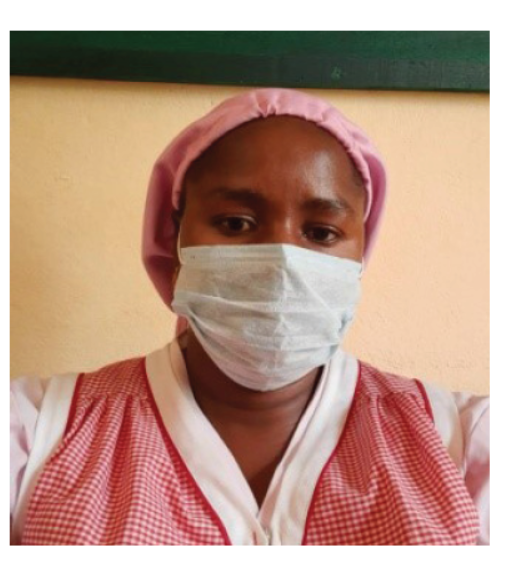
Au Mali, l'accès aux soins de santé est amélioré grâce à l'introduction des mutuelles
Nènè TRAORE | 26/04/2021
Le projet LCIANK emprunte une approche multidimensionnelle et multi-acteurs. Ses activités sont mises en œuvre par 5 ONG belges avec leurs ONG partenaires maliennes pour l'amélioration de la sécurité alimentaire des groupes vulnérables des cercles de Nara, Kolokani et Banamba.Parmi ces ONG, figurent We Social Movements (WSM) / Mutualité Malienne (UTM) qui a pour rôle de mettre en place des mécanismes de protection sociale afin d'améliorer l'accès aux soins de santé.Parmi ces ambitions à atteindre, il y a l'accès aux services sociocommunautaires de base qui constitue une préoccupation majeure pour cette structure afin d'assurer un service durable.La mutuelle tremplin pour booster la fréquentation des centres de santéLa mutuelle de santé a impacté la vie des communautés bénéficiaires. Avant la mutuelle, la fréquentation du centre de santé n'était pas le premier réflexe des communautés. Le premier recours en cas de maladie était soit l'automédication avec les médicaments de la rue, soit le tradithérapeute. Entre temps, des complications peuvent survenir entrainant ainsi des dépenses occasionnant la vente de bien et moyens de subsistance pour se faire soigner. A la date du 31 décembre 2020, la mutuelle de santé de la commune de Kolokani avait comme effectif 3489 personnes dont 1827 femmes (1745 personnes à jour de cotisations) avec une cotisation annuelle de 6000FCFA par personne couverte avec l'appui de l'Etat malien dans le cadre de l'extension de la couverture maladie au secteur informel et agricole. Cette cotisation est supportée à hauteur de 50% par l'Etat. La mutuelle a réussi à la prise en charge des frais de soins de 1428 personnes dont environ 814 femmes pour un montant total remboursé de8161390 FCFA durant la même période à travers les conventions de partenariat signées avec les structures sanitaires (Centre de Santé de Référence (CsRef de Kolokani, 2 Centre de Santé Communautaires(CsCom) et 8 Centres de santé secondaires). La prise en charge des frais de soins est assurée selon le système du tiers payant à savoir le paiement direct de 30% en ambulatoire et 20% en hospitalisation par le mutualiste et les 70 à 80% sont remboursés par la mutuelle respectivement en ambulatoire et en hospitalisation. L'effectif total de la mutuelle de santé de Kolokani est passé de 2025 personnes en 2019 année de sa création à 3489 en 2020 soit un taux d'accroissement de 72,29%.Au regard de ces résultats, les autres constats relevés dans la communauté sont:L 'accès et le recours rapide aux soins de santé qui a pour effet de:-Réduire le temps d'inactivité de l'inspection par la maladie ce qui permet de vaguer à d'autres activités quotidiennes;-Réduire le temps d'absence des écoliers à l'école;-Réduire les dépenses de soins de santé des communautés.-L'arrêt / réduction des ventes de biens personnels, bétails et céréales pour assurer les dépenses des soins de santé,- Le recours premier au centre de santé en cas de maladie ce qui réduit les cas d'utilisation des médicaments de la rue et d'automédication. - L' adoption de certains comportements de prévention contre des maladies à travers des messages d' éducation à la santé.Témoignage de la Directrice technique du centre de santé communautaire de Kolokani: "La mutuelle de santé de Kolokani a beaucoup contribué à l'amélioration de la fréquentation du CSCOM et surtout à un recours rapide aux soins des patients mutualistes. Elle a soulagé beaucoup de patients mutualistes pendant la période de l'hivernage où le paludisme atteint son pic. Avant, les populations étaient attirées plus par le CSREF que par le CSCOM. Cela faisait que le CSCOM était sous fréquenté. Depuis l'arrivée de la mutuelle et du fait que les mutualistes sont constamment sensibilisés sur le respect de la pyramide sanitaire, le centre enregistre des consultations assez croissantes dues aux cotisations des mutualistes. Le centre a aussi profité pour renforcer son plateau technique à travers un kit de laboratoire afin d'offrir au maximum le plus de services aux usagers du centre."
-
RDC: Formation des acteurs de l’EPST-TSHOPO à la tenue de statistiques scolaires
Fabrice KANKU MABIKA | 25/04/2021
Les acteurs de l’EPST des Provinces Éducationnelles TSHOPO 1 et TSHOPO 2 ont suivi dans le courant du mois de Mars une formation sur la compréhension, le calcul et l’interprétation des statistiques scolaires en vue de la préparation de la revue annuelle des performances. Cette activité, organisée et animée par Enabel à travers son programme EDUT, est née d’un souci de conformité à travers une des recommandations de la stratégie sectorielle de l’Éducation et de la Formation, en vigueur depuis 2016. Cette stratégie préconise que les divisions provinciales, les sous-divisions ainsi que les établissements d’enseignement organisent chaque année des activités d’évaluation et de planification. Basées essentiellement sur les données statistiques de l’éducation, ces activités devraient refléter la réalité afin de bien orienter les décisions et les réformes nécessaires au secteur. La province de la Tshopo n’avait jamais bénéficié d’un accompagnement dans ce sens depuis la reconversion des Assises de Promo scolaire en Revue Annuelle des Performances en 2017. Il en résultait des difficultés dans l’élaboration du rapport provincial qui était difficilement exploitable car, ne soulignant pas les avancées et les acquis de la collaboration avec les partenaires. 61 acteurs, dont 3 femmes, des Provinces Éducationnelles TSHOPO 1 et TSHOPO 2, parmi lesquels, les Proveds, les IPPs, les Sous Proveds, les Coordinateurs provinciaux des écoles conventionnées, les Chefs des Antennes de Planification et les Chefs de Station des Statistiques ont tous pris part à cette activité au cours de laquelle, plusieurs points concernant leur gestion quotidienne et les rôles des uns et des autres ont été abordés. Suivant une approche participative et active, la formation a consisté à : - Définir, expliquer, calculer et interpréter chacun des 214 indicateurs suivants les axes de la Stratégie Sectorielle : ACCES, QUALITE, GOUVERNANCE et par niveau : PRESCOLAIRE, PRIMAIRE ET SECONDAIRE. Avec tous les thèmes spécifiques qui alimentent le nouveau canevas des données statistiques, à savoir : Bureaux Gestionnaires, Genre, Gratuité, Situation d’Urgence, Environnement et Sanitaire ; - Définir le format et le contenu de la revue des performances à tous les niveaux (Écoles, Sous Divisions et Province Éducationnelle) ; - Recadrer la gouvernance du secteur à travers la recommandation de la redynamisation des bras techniques (Comités de l’EPST à différents niveaux) et des organes de cogestion (COPA, GOGES, Gouvernement des élèves…) et - Initier à l’élaboration du tableau de bord des différentes entités.Il convient de souligner aussi que cette activité était préparatoire à l’initiation prochaine, de ces différents acteurs, au Progiciel de Gestion Scolaire qu’Enabel mettra à leur disposition dans les mois à venir.
-
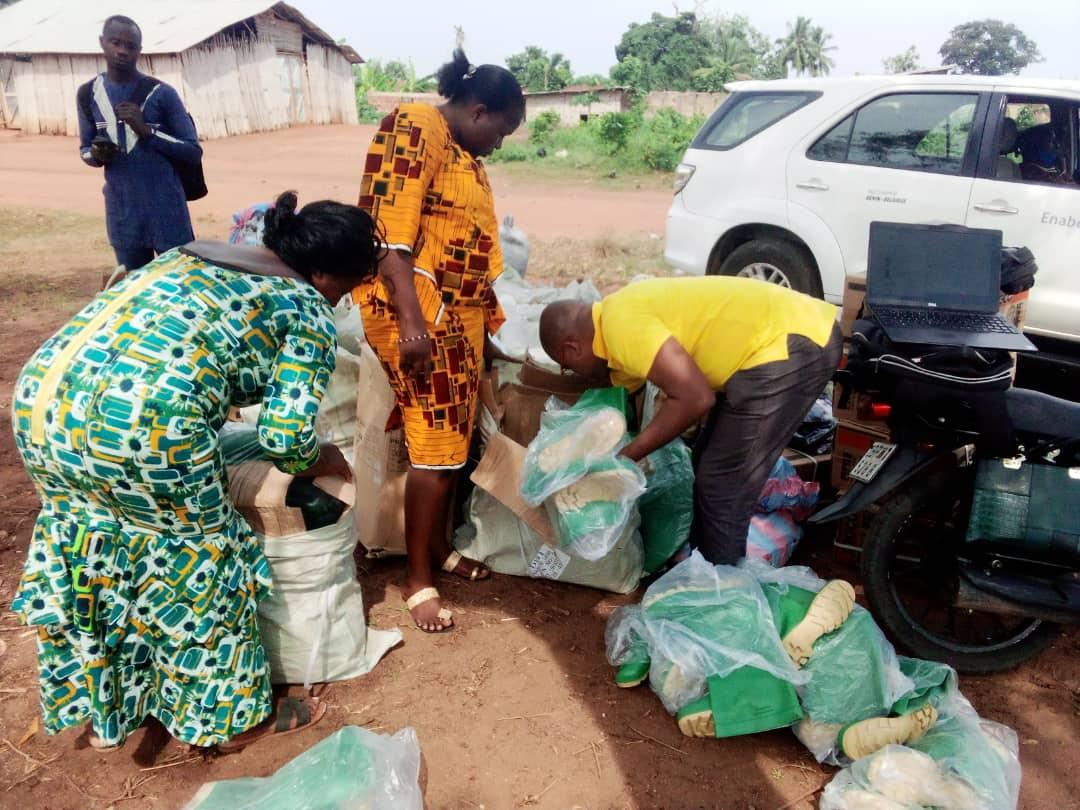
Enabel accompagne les producteurs d’ananas du Bénin vers l’obtention d'une certification d'exportation internationale
Reece-hermine ADANWENON | 23/04/2021
Dans le but d’augmenter les parts de marché de l’ananas au Bénin et à l’international, le programme de Développement de l’Entreprenariat dans la Filière Ananas (DEFIA) mis en œuvre par Enabel en collaboration avec le Comité de Liaison Europe - Afrique - Caraïbes - Pacifique (COLEACP) accompagne la Fédération Nationale des Coopératives Villageoises des Producteurs d’Ananas du Bénin (FENACOPAB) pour la certification de 80 exploitations agricoles de la filière ananas au standard GLOBAL G.A.P. Cette certification, une fois obtenue, permettra aux producteurs d’ananas du Bénin d’exporter leurs fruits partout dans le monde entier. L’objectif principal de cette action est de rassurer les consommateurs sur les conditions de production de l’ananas dans les exploitations agricoles qui minimisent les impacts sur l’environnement, avec une diminution de l’utilisation des intrants chimiques tout en garantissant la santé et la sécurité des producteurs et de leurs ouvriers. Après, le renforcement de capacité technique des producteurs, et la mise en place d’un Système de contrôle interne de suivi et de gestion de la certification au sein de la FENACOPAB, DEFIA entre dans la phase d’appui aux producteurs en matériel et équipements. Dans ce cadre, le programme un acquis des équipements de protection Individuelle au profit des producteurs et de leurs ouvriers agricoles. Ce lot d’équipement composé de : 240 bottes, 240 combinaisons phytosanitaire réutilisable, 240 gants en cuire, 240 Lunettes de protection, 240 masques respiratoires de traitement phytosanitaire à cartouche a été remis le jeudi 22 avril 2021 aux producteurs des 80 exploitations agricoles.Ces équipements seront dans les prochains jours complétés par des équipements d’hygiène sanitaire.
-

5 questions à Véronique Ketelaer, Responsable du Projet Police d'Enabel au Bénin
Reece-hermine ADANWENON | 22/04/2021
Qu’est-ce qu’une Police communautaire et commentaire faire pour que la Police Républicaine au Bénin le soit plus ?Dans cette vidéo, Véronique KETELAER, Responsable du Projet Police au Bénin qui participe à rendre la police béninoise opérationnelle et disponible pour toute la population béninoise répond à cette question.
-
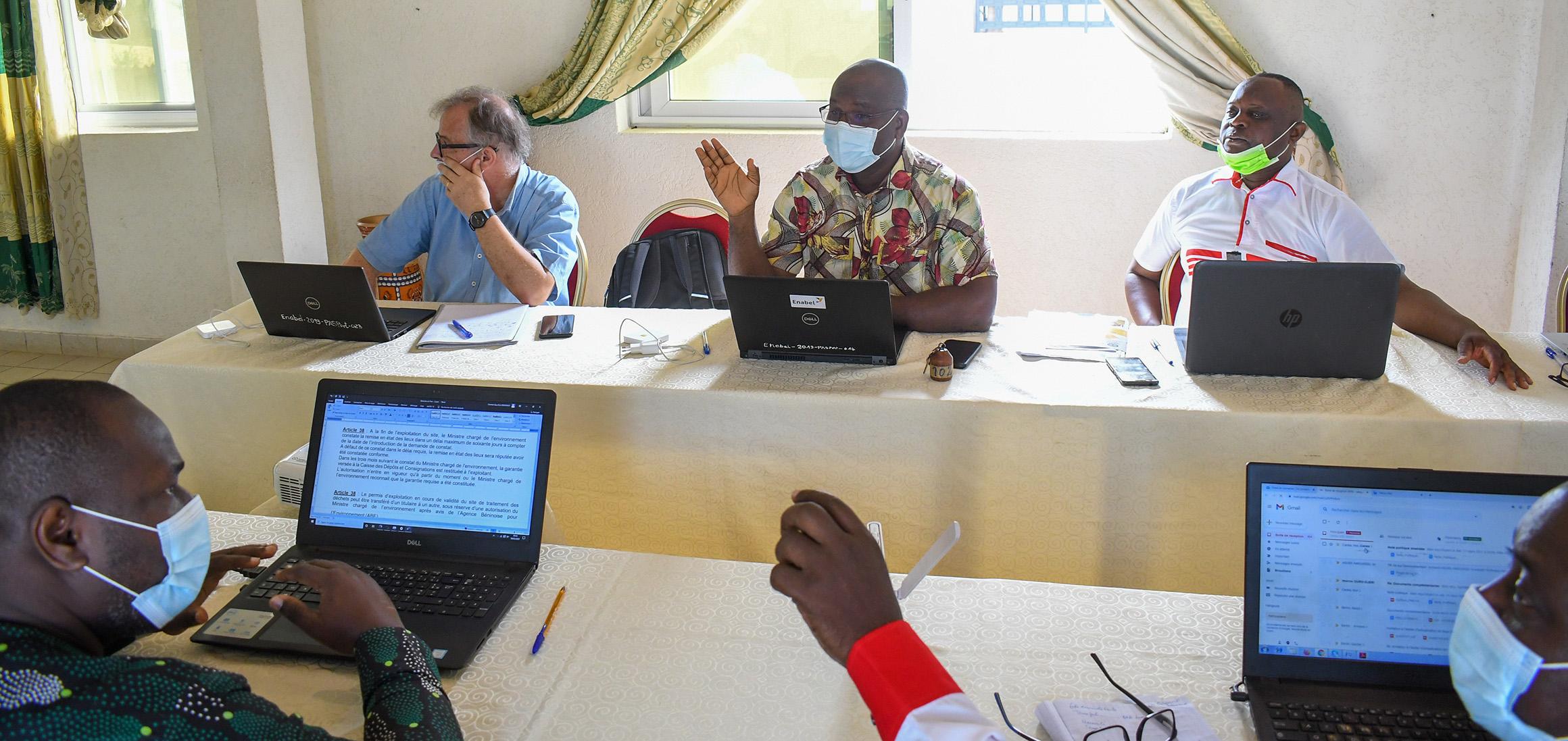
L’arsenal juridique environnemental actualisé
Reece-hermine ADANWENON | 21/04/2021
Toiletter les textes et législations pour une meilleure préservation de l’environnement au Bénin. C’est l’un des objectifs du Projet d’appui au secteur (para) portuaire (PASPort) mis en œuvre par Enabel au Bénin depuis juin 2019. Après trois sessions, tenues entre mars et novembre 2020, un avant-projet de loi sur l’environnement a été présenté aux plus hautes autorités du Ministère du cadre de vie qui l’ont introduit dans le processus devant conduire à sa transmission à l’Assemblée Nationale en vue de son vote. Il faut noter que cet avant-projet de loi a bénéficié de l’assurance-qualité des experts du Service Public Fédéral (SPF) Santé et Environnement du Royaume de Belgique qui ont apporté leurs contributions. L’arsenal juridique environnemental en vigueur au Bénin date de plus de 20 ans et demeure une règlementation dont l’application reste limitée. Aussi, la Direction Générale de l’Environnement et du Climat (DGEC) du Ministère du Cadre de Vie et du Développement Durable (MCVDD) œuvre pour doter le Bénin non seulement d’une nouvelle loi sur l’environnement mais aussi, élaborer ses décrets d’application. Le projet PASPort s’associe à la DGEC et les autres partenaires publics et de la société civile (ONG, associations, personnes-ressources, entreprise, etc.) pour atteindre cet objectif. Ainsi, plusieurs sessions de travail ont eu lieu entre mars et novembre 2020 réunissant des personnes ressources mandatées pour élaborer ce nouveau projet de loi. Pour faciliter la mise en œuvre de cette loi une fois votée, deux autres sessions ont eu lieu entre janvier et mars 2021 pour réviser le décret portant règlementation du bruit et celui portant normes de qualité de l’air et le décret portant des déchets solides et normes de qualité des eaux résiduaires. L’original de ce processus tient non seulement en la complétude du travail- c’est en effet la première fois au Bénin qu’une loi est élaborée en même temps que ses textes d’application, mais aussi dans la démarche très participative et centrée sur le travail d’un « groupe d’experts » en opposition à une approche qui serait centrée sur « l’expert consultant ». L’une des raisons du succès de ce processus tient aussi à la méthodologie utilisée qui peut se résumer en trois points à savoir: - l’identification des experts par atelier et par domaine, - l’évaluation des forces et faiblesses des textes à réviser, - la préparation des ateliers fondée sur la stratégie du benchmarking. Les nouveaux textes sur l’environnement se sont donc enrichis non seulement des succès et échecs des textes actuellement en vigueur, mais aussi des textes des pays de la sous-région et d’ailleurs. Selon le professeur Martin Pépin AÏNA, Directeur Général de l’Environnement et du Climat, Enabel permet au Bénin d’élaborer des textes appropriés qui tiennent compte des réalités du pays et qui sont en cohérence avec les objectifs du gouvernement. Par ailleurs, Enabel et la DGEC comptent s’attaquer aux domaines restés jusque-là non règlementés. Ainsi, la prochaine étape sera de doter le Bénin d’un décret d’application sur la nomenclature des Installations Classées pour la Protection de l’Environnement (ICPE) en avril 2021 et d’un autre sur la lutte contre la pollution des sols avant la fin du mois de juin.
-
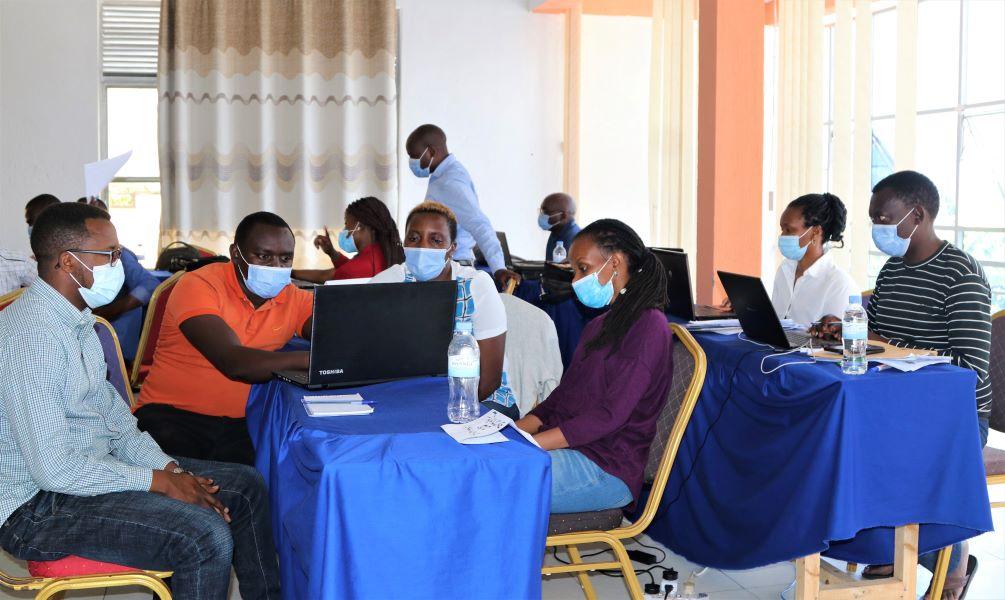
Rwanda: Towards increased family planning uptake and reduced number of home deliveries
Denise NSANGA | 17/04/2021
Decreasing family planning and home deliveries are among other key issues discussed in the Gakenke District Health Management Team meeting convened on 15-16 April 2021 in Musanze.Enabel is providing technical and financial support to address health challenges through its health projects. At the same time, a training on Primary Health Care standards for Nyarugenge District Health Center staff in charge of Quality Management is going on. Enabel is working with partner districts to equip health providers with knowledge and skills for quality improvement and accreditation of healthcare services. Belgium partners with Rwanda to increase the delivery of sexual and reproductive health services including Family Planing services as well as access of households to health care. The intervention is jointly implemented by Enabel and Rwanda’s Ministry of Health.
-
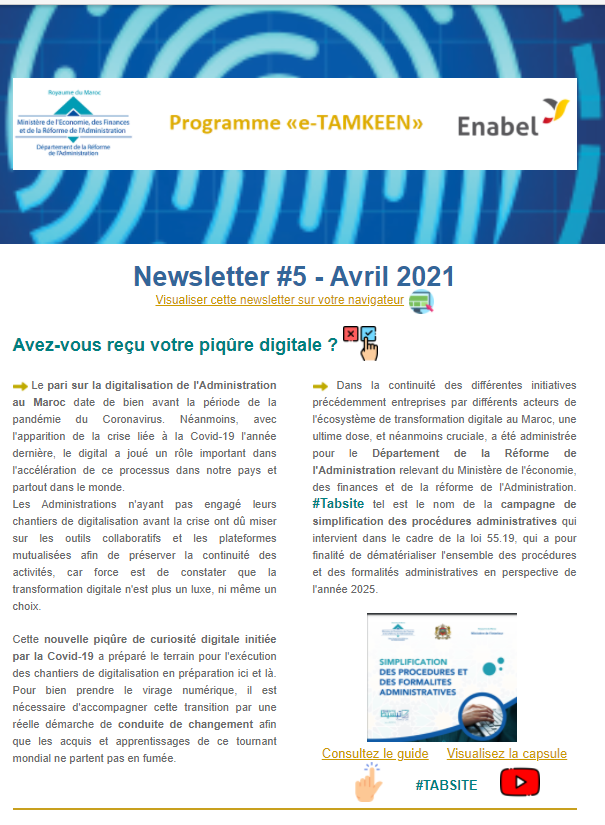
Consultez la 5éme newsletter trimestrielle de l’intervention e-TAMKEEN du Maroc!
Bassam ALAOUI MDAGHRI | 15/04/2021
Cette cinquième édition de la newsletter #eTAMKEEN s'intéresse particulièrement à l'initiative #Tabsite, le nom donné à la campagne de simplification des procédures administratives dans le cadre de la loi 55.19, qui a pour finalité de dématérialiser l'ensemble des procédures et des formalités administratives en perspective de l'année 2025.Elle informe également sur le baromètre des directions des systèmes d'information (DSI) en 2021 et les grands chantiers de digitalisation en cours de mise en œuvre dans les différentes Administrations marocaines, ainsi que sur les activités en cours du programme e-TAMKEEN, dont la poursuite de l'accompagnement de l'initiative #IDARATHON.Consultez la Newsletter via ce lien : https://bit.ly/3di0ApL Et pour vous inscrire à nos prochaines Newsletters, c'est par ici: http://eepurl.com/gYow-5Bonne lecture!
-
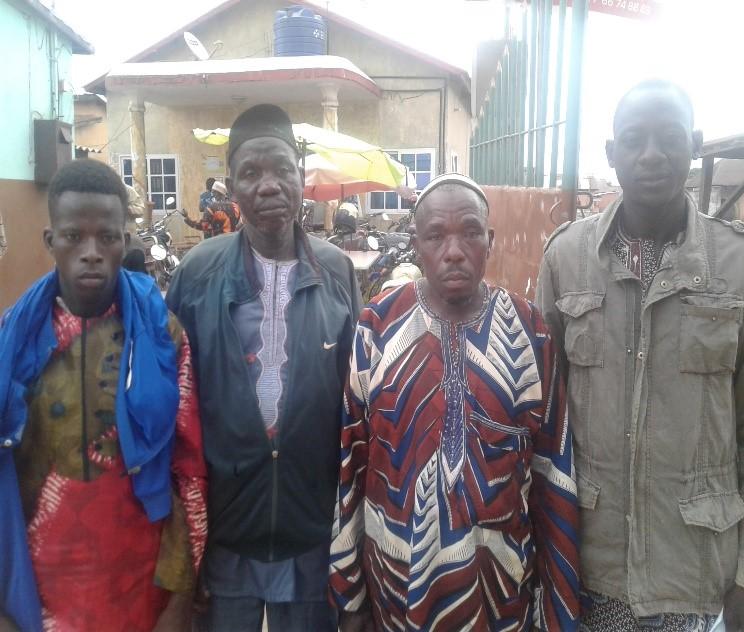
Au Bénin, l’apiculture se veut être une filière porteuse
Reece-hermine ADANWENON | 13/04/2021
Kondé BATEMA, âgé d’une soixante d’années est l’un des bénéficiaires des ruches installes dans le cadre de la mise en œuvre des Micro-Projets (MIC) du volet opérationnel du Programme d’appui au Développement des Filières Agricoles au Bénin (PROFI) exécuté par Enabel au Bénin. Propriétaire de 5 ha de plantations d’anacardiers, il a bénéficié de la mise en place de 14 ruches en 2018. Après trois ans, il se réjouit de l’augmentation de sa production mais aussi de ses revenus. «Cela contribue à la satisfaction de mes besoins grâce à la vente du miel. Je ne nourris pas mes abeilles,c’est plutôt elles qui me nourissent. L’an dernier, j’ai obtenu 350 000 FCFA de la vente de 175 litres de miel avec une augmentation de plus de 60% de ma production« . Ce sont là les propos tenus par Kondé Batema lors de la mission d’évaluation de la colonisation des ruches installées en 2018. Comme lui, Awali Mama Baparape, Issa Orou Yorou, Idrissou Boukari et Arouna Baboni, 4 producteurs de la coopérative villageoise des producteurs d’anacarde de Kabaré, village situé dans l’arrondissement de Fõtancé commune de Kouandé sont également bénéficiaires de 56 ruches. Trois ans après l’installation des ruches, les retombées commencent par être visibles au niveau de ces bénéficiaires. Les 56 ruches reçues par les 4 bénéficiaires du village de Kabaré ont permis à 13 autres producteurs don’t 3 femmes de bénéficier aussi de ruches, grâce à un mécanisme de solidarité mis en place par la coopérative de producteurs d’anacardier. Le mécanisme de solidarité consiste à faire une vente groupée du miel récolté et de répartir les recettes de la vente du miel entre les propriétaires des ruches et les autres membres de la coopérative (50% des ressources mobilisées reviennent aux producteurs bénéficiaires tandis que les 50% restantes sont utilisées pour la confection de nouvelles ruches au profit des autres membres de la coopérative n’ayant pas bénéficié de ruches). Ce mécanisme d’autofinancement des ruches est partagé par l’ensemble des membres de la coopérative villageoise des producteurs d’anacarde de Kabaré.
-
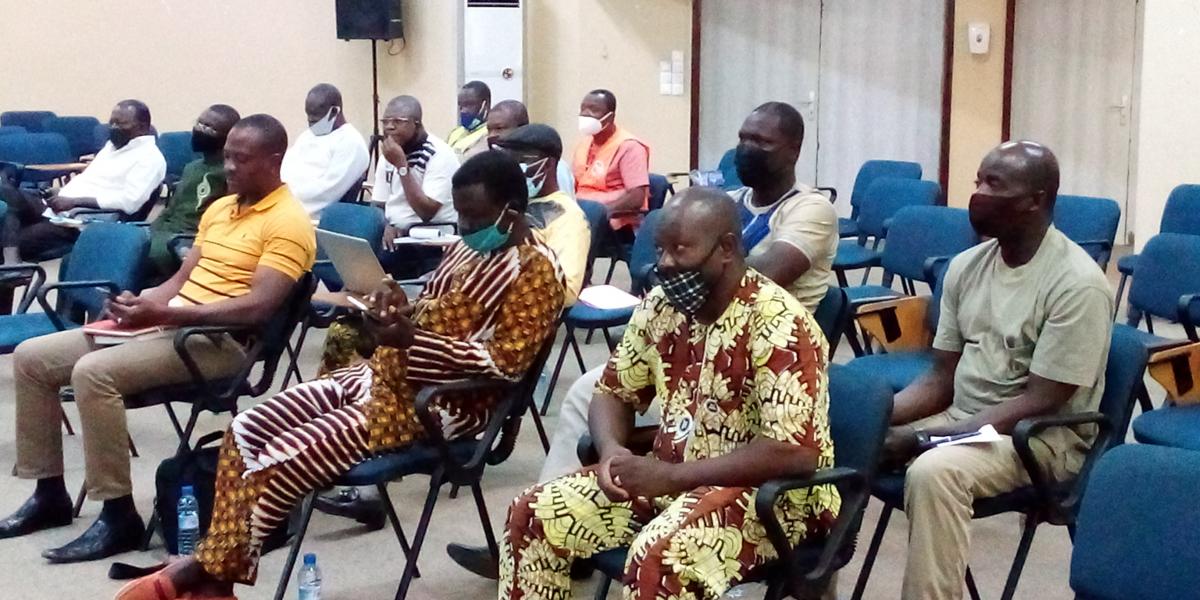
Enabel appuie l’amélioration du cadre réglementaire et institutionnel du secteur portuaire au Bénin
Reece-hermine ADANWENON | 13/04/2021
40 à 60 % des marchandises traitées au Port de Cotonou vont en direction des pays de l’arrière-pays(Niger, Burkina Faso, Mali, Tchad)et du géant voisin du Nigéria à travers les axes routiers. Le décret n°79-109 du 15 mai 1979 vieux de plus d’une quarantaine d’années et ses arrêtés d’application indispensables pour le sous-secteur du transport routier est caduque et nécessite une actualisation. Des efforts de modernisation ont été engagés par les pouvoirs publics à travers les différentes réformes en cours, néanmoins beaucoup restait à faire. Aussi, une séance de validation du rapport diagnostic du sous-secteur du transport routier au Bénin s’est tenue le 08 avril 2021 dans la salle de conférence du Conseil National des Chargeurs du Bénin pour l’actualisation dudit décret. Ce diagnostic a ébauché les pistes d’élaboration du nouveau décret et de ses arrêtés d’application. La séance, présidée par le Secrétaire Général Adjoint du Ministère des Infrastructures et des Transports (MIT) et du Directeur des Transports Terrestres, un connu la participation assidue des acteurs importants du sous-secteur. Maintes observations ont été portées et seront transmises aux consultants commis à l’actualisation des textes. L’étape suivante consistera à la proposition par les consultants, du projet du nouveau décret et de ses arrêtés d’application à faire valider par les parties prenantes et faire adopter en conseil des Ministres. Organisé par le Projet d’Appui au développement du Secteur Portuaire (PASPort), cette action permettra d’aider le Bénin dans la mise en place d’un cadre réglementaire actualisé locataire compte des évolutions pour une activité portuaire performante.
-

Bénin: Elaboration des plans de renforcement de capacités (PRC) des acteurs territoriaux du secteur agricole
Reece-hermine ADANWENON | 13/04/2021
Afin d’identifier les besoins en renforcement des compétences de chaque acteur clé du secteur agricole au niveau territorial (Agence Territoriale de Développement Agricole (ATDA), Directions Départementales de l'Agriculture de l'Elevage et de la Pêche (DDAEP), Organisation Interprofessionnelle Paysanne (OIP), Chambre Nationale de l'Agriculture (CNA), et les mairies à travers leurs associations), le projet ARISA-B, une commande une étude en vue d’élaborer les plans de renforcement de compétences (PRC) en lien avec les capacitaires identifiés. La méthodologie utilisée prend en compte quatre étapes clé : l’élaboration des référentiels, l’analyse situationnelle, la détermination des lacunes capacitaires et l’adoption du plan de renforcement de capacités. Pour chacune de ces étapes, on peut retenir : - l’élaboration des référentiels de compétences : 60 participants ayant pris part à l’atelier « zéro » en provenance de : 7 ATDA, 7 DDAEP/12, 2 interprofessions, 2 faîtières d’Organisation Interprofessionnelle et Organisation Professionnelle Agricole nationale (OPA), la Chambre Nationale d’Agriculture (CNA) et l’Association Nationale des Communes du Bénin (ANCB), l’Union des Communes du Zou (UCoZ) ; - l’analyse situationnelle des compétences des acteurs : plus de 25 regroupements/mini-ateliers avec les acteurs ; 950 fiches individuelles renseignées ; 133 fiches de diagnostic organo-fonctionnel renseignées ;- la détermination des gaps capacitaires : Six (6) « mini-ateliers » avec un total de 90 participants en provenance de toutes les structures. On note une représentation plus importante des acteurs non étatiques (OIP/OPA/Chambres) ; - l’adoption du plan de renforcement : un atelier national présidé par le Ministre de l’Agriculture de l’Elevage et de la Pêche (MAEP) un permis de valider les Plans de renforcement de chaque acteur territorial. Chacune de ces étapes a mis les acteurs privés, décentralisés et déconcentrés au cœur du processus afin de leur permettre d’acquérir des aptitudes en matière d’élaboration des plans de renforcement de compétences, en même temps qu’elle a mis un point d’honneur sur la promotion du dialogue autour des centres d’intérêts des uns et des autres pour la promotion de l’agriculture. Au terme du processus, huit (08) Plans de Renforcement de Capacités ont été validés par les acteurs territoriaux du secteur agricole ne sept (07) PRC spécifiques pour les sept (07) Pôles de Développement Agricole et Un (01) PRC spécifique pour les acteurs non étatiques. Il ne s’agit pas d’avoir des PRC étiquettes « ARISA-B » ciblant uniquement un programme d’action à mettre en œuvre par le projet mais des PRC identifiant un ensemble d’actions pouvant être appuyées par différents acteurs et/ou PTF. ARISA-B : recrutement des organismes de formation pour la mise en œuvre des actions de renforcement de capacités. Pour l’ensemble des PRC, neuf (09) Cahiers Spécifiques de Charges (CSC) suivants ont été élaborés pour prendre en compte les domaines, axes et actions de renforcement de capacités. 1. Renforcement des mécanismes de programmation, coordination, de suivi-évaluation et de capitalisation des interventions au profit des acteurs territoriaux, conformément à leurs rôles et mandats ; 2. Approches et méthodes d’identification et de priorisation des investissements agricoles structurants ; 3. Exercice de la maîtrise d’ouvrage communale et les méthodes et techniques en matière de suivi de la réalisation et de la gestion durable des Investissements Agricoles Structurants ; 4. Assistance opérationnelle à la fourniture de services-clés relatifs au conseil agricole, au financement et à l’émergence des clusters au profit des acteurs des pôles de développement agricole ; 5. Accompagnement des acteurs non étatiques et privés des filières agricoles pour le développement institutionnel des organisations professionnelles et interprofessionnelles agricoles ; 6. Parcours d’acquisition des compétences pour l’élaboration, le suivi et l’évaluation des plans de renforcement des capacités des acteurs des pôles de développement agricole ; 7. Méthodes et techniques de concertation et de dialogue entre différentes familles d’acteurs des filières et entre elles et les acteurs publics ; 8. Gestion des services publics et gestion du changement ; et, 9. Renforcement des Capacités des acteurs du dialogue politique multi acteurs dans le secteur agricole au niveau des territoires. Sur la base de ces Cahiers de Charges, ARISA-B a conduit le processus de recrutement de sept (07) organismes de formation. Afin d’assurer la qualité tant de la démarche d’élaboration des outils que des choix pédagogiques, ces organismes sont appuyés transversalement par un cabinet spécialisé en ingénierie de formation.Pour la mise en œuvre des actions de formation, pour chacune d’entre elles, il a été élaboré un descriptif du module (objectif de formation, objectifs pédagogiques, contenu, démarche méthodologique, évaluation), un guide du formateur, un manuel de l’apprenant ainsi que les outils d’évaluation (pré et post tests, évaluations de satisfaction). A l’issue du processus, environ cent-cinquante (150) outils (descriptifs, guides et manuels) ont été élaborés et validés ; marquant ainsi la fin de la phase de préparation des PAC. Sur la base de ces outils, ARISA-B a lancé la phase B des PAC : celle du renforcement des capacités proprement dit des acteurs territoriaux du secteur agricole. Il faut souligner que l’appréciation de chaque module a été conduite sous la supervision des porteurs de fonctions au niveau national afin de s’assurer de l’arrimage du contenu des supports et de la démarche avec les dispositifs et stratégies sectoriels. Témoignage de Camille AZOMAHOU, participant à l’atelier de validation des PRC:« J'ai senti à l'issue des trois jours passés, le début d'un processus nouveau avec une démarche nouvelle en matière de renforcement des capacités et du point de vue de l'élaboration d'un plan de renforcement de capacités. Cela donne déjà à mon niveau un déclic pour entreprendre au niveau de l'Interprofession de l'Aviculture du Bénin (IAB) une restitution tout au-moins au Conseil d'Administration afin d'anticiper sur la suite à envisager. »
-

Au Bénin, le projet ARISA-B renforce les capacités des acteurs du secteur agricole
Reece-hermine ADANWENON | 13/04/2021
Le projet d’Appui au Renforcement des Institutions dans le Secteur Agricole au Bénin (ARISA-B), financé par l’Union Européenne et mis en œuvre par Enabel sur toute l’étendue du territoire du Bénin, a démarré ses activités opérationnelles en 2019. Après l’évaluation des besoins en formation, l’élaboration et la validation desplans de renforcement de capacités des acteurs territoriaux du secteur agricole, le projet a conduit le processus de préparation de ses actions de renforcement de capacité, clôturant ainsi, en juillet 2020, la première phase de l’approche Parcours d’Acquisition de Compétences retenue par le Projet pour une meilleure appropriation des réformes dans le secteur agricole.Les réformes engagées par le Gouvernement du Bénin dans le secteur agricole en 2016 ont induit de nouveaux mandats aux acteurs territoriaux dudit secteur. Afin d’accompagner lesdites réformes et les politiques sectorielles associées, l’Union Européenne met en œuvre, le Programme d’Appui au Développement Durable du Secteur Agricole (PADDSA) qui prend en compte un appui complémentaire décliné en deux dispositifs : un Appui Complémentaire Centralisé (ACC) et un Appui Complémentaire Territorialisé (ACT). Ce dernier est piloté sur la base d’une convention de délégation avec Enabel Bénin au travers du projet ARISA-B. Il vise à renforcer les acteurs au niveau des Agences Territoriales Départementales Agricoles (ATDA), Directions Départementales de l’Agriculture, de l’Elevage et de la Pêche (DDAEP), Communes et leurs associations, Organisations Paysannes Agricoles (OPA), Organisation Interprofessionnelle (OIP) dans leurs compétences à assumer leurs rôles et mandats pour le développement agricole conformément au nouvel environnement généré par les réformes. Il doit également permettre de renforcer un dialogue positif et constructif entre acteurs pour la mise en œuvre des politiques agricoles. Une approche qui met les aptitudes des apprenants et des structures au centre du processus de renforcement de compétences… ARISA-B, dans le cadre du renforcement des institutions dans le secteur agricole au niveau des territoires, a opté pour l’approche « Parcours d’Acquisition de Compétences » (PAC). Le PAC est un ensemble approprié, structuré et accompagné de différents modes d’apprentissage qui permet à l’individu d’acquérir (et de s’approprier) les aptitudes nécessaires pour assumer certains rôles clés pour l’organisation qui l’emploie. Le PAC se déroule en trois grandes phases : une phase préparatoire (phase A), une phase de renforcement des capacités (phase B) et une phase de consolidation (phase C) visant à accompagner et suivre la mise en pratique en situation réelle de travail des acquis de formation. L’approche PAC marque une rupture avec les autres logiques de conception et de mise en œuvre d’actions de formation. Le PAC permet véritablement la construction de compétences, en ce sens qu’elle ne se contente pas seulement de laisser l’apprenant avec les capacités acquises à la fin de la phase de transmission de savoir, savoir-faire et savoir-être. Le PAC s’intéresse particulièrement au transfert des acquis de formation en situation de travail. Il est évident que l’on sort d’une formation avec des capacités et tant que ces capacités n’ont pas été prouvées en situation réelle de travail, on ne saurait parler de compétences. Ainsi, à la différence des autres approches, le PAC permet la construction de compétences car il accompagne l’apprenant jusque dans sa situation professionnelle et s’assure que les acquis de formation sont effectivement transférés.
